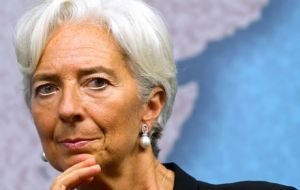MercoPress. South Atlantic News Agency
IMF chief praises Latinamerica, which can provide ‘some lessons to the advanced world’
 Ms Lagarde is expected this week in Mexico, Brazil and Peru
Ms Lagarde is expected this week in Mexico, Brazil and Peru IMF chief Christine Lagarde who this week will be visiting Latinamerica said that Brazil, Mexico and Peru, like to many other countries in the region have done remarkably well over the past few years and can provide some lessons to the advanced countries.
Lagarde’s first official trip to Latinamerica coincides with the transfer of leadership in the G20 (group of leading developed and developing economies) to Mexico, a country “in a unique position to shape our collective economic destiny over the coming year”.
The IMF chief described Brazil as “one of the world’s leading emerging markets, deeply integrated into the global economy that will play a central role in the global economic debate, and will be instrumental in harnessing the global cooperation needed to address the urgent challenges of the day”.
Regarding Peru, Lagarde said it is “a new rising star, surely among the new wave of leading emerging”.
“I believe Latin America is now on a firm foundation, and can look ahead to lasting prosperity and stability that can lift the living standards of all”, said Lagarde.
“These countries have harvested the fruits of strong fundamentals, sound policy frameworks, and prudent macroeconomic policies and are now enjoying sustained growth with reduced vulnerabilities—an enviable sweet spot”, added the IMF chief recalling that its wasn’t always like this.
In the old days, a disruption on the scale of the 2008-09 global financial crisis would have triggered major upheavals since Latinamerica tended to be one of the most exposed and vulnerable regions.
“Not any longer. In fact, the new Latin America can provide some lessons to the advanced countries—such as saving for a rainy day, and making sure that risks in the banking system are under control”.
However Lagarde also pointed out that Latin America is not immune to any storms that come out of Europe, “no one is, in our interconnected world, there is simply nowhere to hide”.
The challenge for the region going forward is to sustain growth in a very volatile environment. Mexico will need to keep a keen eye on conditions in the United States and Europe, and implement structural reforms to unleash its growth potential. A key challenge for Brazil will be to increase domestic savings to reach higher and sustained growth. And Peru would benefit from continued reforms to achieve more inclusive growth while preserving its hard-won macroeconomic stability.
“But growth alone is just the first step: the region in general needs more socially inclusive growth, which means efforts to build fairer societies based on shared opportunities and social justice”.
Lagarde said that historically, inequality has been the bane of Latin America. Not only did this prevent large swaths of the population from sharing in the gains of growth, but it also contributed to social and political instability—which in turn hurt economic prospects.
“Indeed, recent IMF research has shown that more equal societies are associated not only with greater economic stability, but with more sustainable growth over time. So growth and social inclusion are really two sides of the same coin”.
Lagarde identified social inclusion as one of the factors behind the region’s recent economic progress: in countries like Brazil and Peru, indicators of poverty, inequality, and human development have improved dramatically over the past decade or so.
Brazil’s Bolsa Familia and Mexico’s Oportunidades programs have enjoyed particular success in breaking the intergenerational transmission of poverty—so much so that they are now models for the rest of the world.
Finally Lagarde said that the global economy is transforming and Latin America is definitely on the rise, “and the three countries I am visiting represent—each in their own way—the next generation of global economic leadership”.




Top Comments
Disclaimer & comment rules-

-

-

Read all commentsis there a need to have demode institution IMF !!??
Nov 27th, 2011 - 09:37 am 0Just ask to those countries that have been benefited with it loans under commitment to improve their economic and social mismanagement. And also to those that can´t do it because they don´t acomplish with their compromise.
Nov 27th, 2011 - 10:36 am 0The IMF, WB and others similar international institutions last decades over LATAM gvt. is now giving good results with a region that have learnt the lesson of austerity, stability, investiment and well management on the most of their countries (unless some exceptions that confirmed the rule)......
“Brazil’s Bolsa Familia and Mexico’s Oportunidades programs have enjoyed particular success in breaking the intergenerational transmission of poverty”
Nov 27th, 2011 - 01:25 pm 0The majority (?) of Brasil's poor now 'live on the social', as they say in the UK.
Because they receive - from the middle class, not from the rich - they can spend that which they have not earned.
It has become 'entitlement money' which Dilma has not found a way to stop once a family becomes 'entitled'.
Sounds good, even looks good in UN reports, but the bottom line is that Brasil has created a Developed World dependency society in a place which is not yet the Developed World.
The BIG TRICK will be to insist on Education *Performance* as the quid pro quo for receiving the Bolsa.
The external monitoring of performance against projections will reveal some REAL home truths.
But performance is what it should be all about.
Simply giving the Bolsa for attendance does little as the attendence is spasmodic and the education is politicisied and *very* poor by OECD standards.
But I agree, the development of a nation progresses best with maximum 'equality' - but equality comes from *QUALITY* education leading to quality employment, not from entitlement/dependency handouts.
Commenting for this story is now closed.
If you have a Facebook account, become a fan and comment on our Facebook Page!